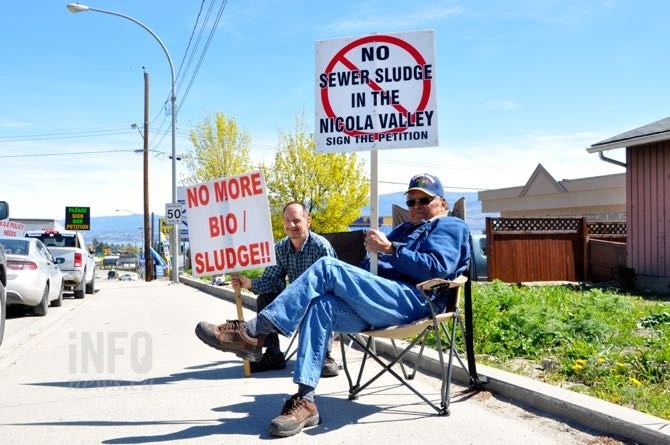
The occupation of Christy Clark's West Kelowna constituency office may have ended but opposition to biosolid disposal has not.
(JOHN MCDONALD / iNFOnews.ca)
December 03, 2015 - 4:35 PM
WEST KELOWNA - Westside residents expecting costs for sewage treatment would stabilize this fall shouldn’t hold their breath.
West Kelowna, Westbank First Nation and Peachland have been paying huge premiums while waiting along with the rest of the province for a technical committee to complete a scientific review of how we fertilize land with sewage sludge.
That committee was supposed to make recommendations to the Minister of Environment this fall. Now the ministry tells infoNEWS.ca that’s been pushed to at least January.
Peter Rotheisler, environmental services manager with the Central Okanagan Regional District, admits the short-term solutions are expensive but necessary until local governments have certainty in choosing a long-term solution.
“Everybody is waiting on that process to be completed to identify what the path forward is,” he said. “That’s the biggest hold up right now.”
The Central Okanagan’s western communities had a contract with a private company called BioCentral to take its treated sludge — essentially everything from a sewer without the water — and used it as fertilizer on farm land near Merritt. That came to an abrupt end when protesters there complained and blocked roads to keep the company out.
Once BioCentral couldn’t take the sludge, the regional district needed options and found one farther north. Now it’s taken to Clinton, B.C. under a short-term contract but that means costs for 2015 went up 71 per cent to roughly $825,000 from about $481,000.
There aren’t many other options. The Westside landfill is closed, the smell is considered prohibitive for the Glenmore landfill and Ogogrow — an end fertilizer product for Kelowna sludge — is at capacity.
The Nicola Valley protesters make numerous claims about potential damage to land and human health because of contaminants in the sludge. While the true danger of those contaminants remains in technical analysis, the alternative — burning it — isn’t the greatest option either. It pollutes the air, is expensive and in no way beneficial.
“Like most waste products, we want to see if there is an option to utilize (it) as a resource,” Rotheisler says.
The province established the committee in June 2015 and said it expected results by fall.
For now, residents in Premier Christy Clark’s riding are footing the extra bill, but Rotheisler says all municipalities are watching this technical committee and waiting. Kelowna may soon need to find other solutions and Kamloops is wrestling with the issue as well.
“(They are) essentially waiting on us to break the ground here to see what the sustainable option is going to be so they can jump on board,” he says.
To contact the reporter for this story, email Marshall Jones at mjones@infonews.ca or call 250-718-2724.
News from © iNFOnews, 2015